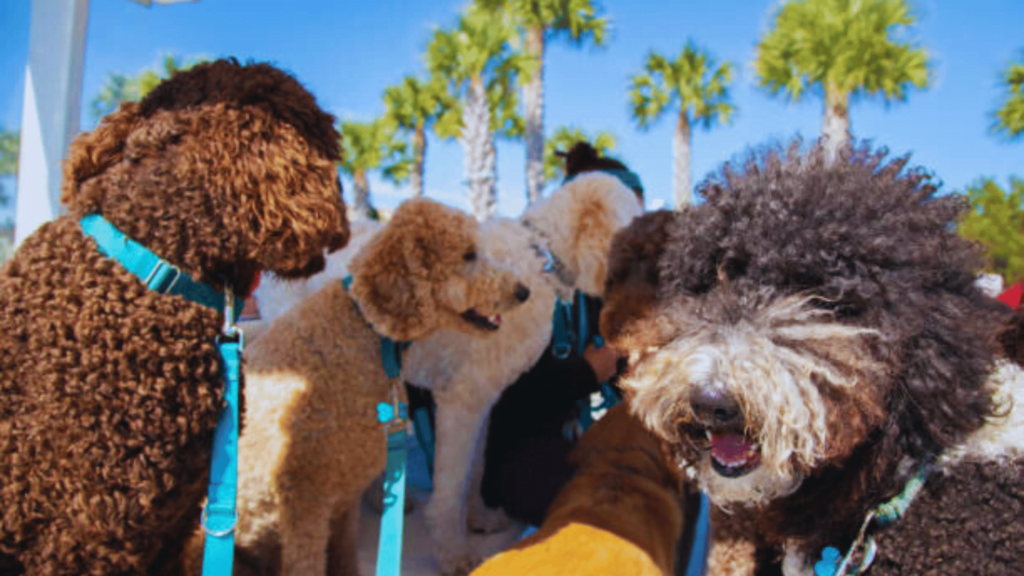For this section, let us engage in understanding the Mini Bernedoodle. It’s like a blend of a Bernese Mountain Dog and a Miniature Poodle.
Combining the wonderful features of both parents, these pups inherit their looks, friendliness, and even a coat that won’t bother people with allergies much.
They’re extremely good peers for anyone – whether you have several children, live on your own, or are wholly enjoying your golden years.
We’re going to go through all the basics you must know about these dog Breeds: their average life span, how large they get, and all the good and not-so-good characteristics about having them around.
History and Background of the Mini Bernedoodle

The Mini Bernedoodle is a newer dog breed that comes from mixing a Bernese Mountain Dog with a Miniature Poodle. It was bred to be a smaller, more manageable dog while keeping the best qualities of both parent breeds.
This breed became popular in the early 2000s, especially in North America, as people wanted a family-friendly dog that doesn’t shed much and can live in different homes. The Mini Bernedoodle is known for being playful, loving, and great for both cuddling and outdoor activities.
Lifespan of a Mini Bernedoodle
The average lifespan of a Mini Bernedoodle is somewhere between 12 and 18 years. I believe, as you might hold credence also, that keeping them healthy means they may potentially even live longer than dogs that aren’t mixes.
You see, mixed-breed dogs often have something going for them, called hybrid vigor, which, boils down to: being a mix can make them healthier and livelier than dogs that are just one breed.
Factors Affecting Lifespan:
Now onto the nitty-gritty on how to help your Mini Bernedoodle live a long and healthy life. Starting off, what they eat is extremely critical. You must feed them first rate dog food that’s right for their age, how much they weigh, and how active they are; think good food time.
Then, there’s exercise. Keeping them moving isn’t only about staying trim it also keeps their mind sharp and their spirits high.
A happy dog is a healthy dog. Finally, but very important, is taking them to the vet regularly. This isn’t only for when something’s wrong. It regards preventing phenomena from going south in the first place.
Vaccinations, check-ups, everything – it all goes a very long way towards keeping your friend by your side, wagging their tail, for as long as possible.
Those are the important things when it comes to having a Mini Bernedoodle and wanting them around for a good, long time.
Size of a Mini Bernedoodle
The size of a Mini Bernedoodle can vary depending on the size of the Poodle parent, but they typically weigh between 25 to 49 pounds and stand 18 to 22 inches tall at the shoulder.
- Weight: 25 to 49 pounds
- Height: 18 to 22 inches
Mini Bernedoodles are smaller than Standard Bernedoodles but larger than the Toy Bernedoodle. Their medium size makes them ideal for both apartment living and homes with large yards.
Personality and Temperament

Mini Bernedoodles catch on quickly and are total aces when it comes to training and following commands. They are extremely cute, always ready to work with you and mix into whatever you’re up to for the day.
Their friendliness isn’t simply limited to being around people young people and other animals? They’re happy with them too, making it amazing for homes thinking about getting these little baby animals.
Whether they’re frolicking outside or just relaxing at home, these dogs are just content being by your side. You would surely grasp, with reasons abounding, why they’re a prime pick for any family — there is unsurprisingly a potential to truly enrich a household.
Temperament Traits:
- Friendly: They love being around people and other pets.
- Loyal: These dogs form strong bonds with their families.
- Intelligent: Easy to train and eager to please.
- Playful: They enjoy activities like fetch, hiking, and agility.
Pros of Owning a Mini Bernedoodle
Mini Bernedoodles are highly intelligent and quick learners, traits they inherit from their parent breeds.
They are easy to train, especially with positive reinforcement, and can quickly grasp new tricks and commands.
One of their standout features is their hypoallergenic coat, making them a good choice for people with allergies. This trait comes from their Poodle lineage.
If you have allergies but still want a furry friend, Mini Bernedoodles are a great option. They are naturally friendly and affectionate, making them ideal companions.
Mini Bernedoodles thrive in family settings, easily getting along with children, other pets, and even new people. They are full of love and are always ready to be part of your family adventures.
Thanks to their moderate size, they can comfortably live in apartments or smaller homes, as long as they get regular exercise.
Whether you enjoy outdoor activities or prefer a more relaxed lifestyle, the Mini Bernedoodle can adapt. They love being active but are just as happy to relax indoors with their owners.
Cons of Owning a Mini Bernedoodle
Mini Bernedoodles don’t like being left alone for long periods. If they are by themselves too much, they may start acting out by chewing on things or barking excessively. These dogs thrive when they have company, and it’s best if someone is around to interact with them during the day.
Grooming Needs: Keeping Their Coat Tangle-Free
Taking care of a Mini Bernedoodle’s coat requires regular effort. Their curly or wavy fur needs to be brushed a few times a week to prevent tangles and mats, which can be uncomfortable for them. Additionally, they need a haircut every couple of months to keep them looking neat. Skipping grooming can lead to painful matting.
Price and Health Considerations
Mini Bernedoodles are in high demand, and their price can go as high as $5,000. Caring for them also involves some costs, especially for grooming and health care. Thanks to their mixed breed status, they benefit from hybrid vigor, which can make them healthier than their purebred parents. However, they are still prone to some genetic health issues like hip and elbow dysplasia, vision problems, or allergies.
Finding a Reputable Breeder
To minimize the risk of health problems, it’s crucial to find a breeder who does health testing on their dogs. This ensures that you’re getting a healthy puppy and helps avoid costly and painful issues down the road.
Energy Levels and Mental Stimulation
Mini Bernedoodles have moderate energy levels. They aren’t overly hyper, but they do need regular physical and mental activity to stay happy. Games like fetch or puzzle toys are great for keeping them entertained and stimulated.
A Hefty Price but Worth the Investment
While Mini Bernedoodles come with a high price tag and require some work in terms of care, they offer lots of love, adaptability, and companionship. Investing in their well-being by finding a good breeder and providing the right care can ensure a happy and healthy life for these adorable dogs.
Exercise Requirements for Mini Bernedoodles
Mini Bernedoodles, a delightful mix of Bernese Mountain Dog and Miniature Poodle, are known for their friendly and playful personalities. Like any dog, they thrive on exercise to stay healthy and happy, but their needs are a bit more moderate compared to larger breeds.
How Much Daily Exercise Do Mini Bernedoodles Need?
Typically, Mini Bernedoodles require about 30 to 60 minutes of exercise each day. This can vary based on their age, energy levels, and overall health. Younger pups tend to be more energetic and may need a little extra playtime, while older dogs might prefer shorter, more leisurely activities.
It’s important to pay attention to your dog. If they seem restless or bored, they might need more exercise. On the flip side, if they’re tired and content, you’re likely hitting the right balance.
Suggested Activities for Mini Bernedoodles

To keep your Mini Bernedoodle fit and happy, consider mixing up their routine with a variety of fun activities:
- Daily Walks: Aim for two walks of 20 to 30 minutes each. This gives them a chance to explore new sights and smells. Mini Bernedoodles love discovering new places, so change up your route to keep things exciting!
- Playtime: Engage in games like fetch, tug-of-war, or simply chasing after a ball. These activities are not just great for burning energy, but they also strengthen your bond.
- Mental Stimulation: Dogs need mental workouts too! Try puzzle toys, hide-and-seek, or teaching them new tricks. These activities keep their minds sharp and can be a lot of fun for both of you.
- Off-leash Fun: If you have a safe, fenced area or a dog park nearby, let your Mini Bernedoodle run free! Playing with other dogs or just zooming around can be incredibly fulfilling for them.
- Interactive Toys: Treat-dispensing or interactive toys are perfect for keeping your dog entertained and mentally stimulated, especially on days when outdoor play isn’t an option.
Mini Bernedoodle Diet and Nutrition
Keeping your Mini Bernedoodle healthy and happy starts with a balanced diet. By understanding their specific nutritional needs, you can ensure your furry friend gets the best care possible.
Appropriate Food for Their Size and Energy Levels
Mini Bernedoodles need high-quality dog food that fits their size and energy. Here’s what to look for:
- High-Quality Ingredients: Always check the label for real meat like chicken or beef as the first ingredient. This guarantees your Mini Bernedoodle is getting enough protein, which is crucial for their energy, muscle growth, and overall health.
- Balanced Nutrition: Look for a good mix of proteins, healthy fats, and carbohydrates. Healthy fats, such as omega-3 and omega-6, are fantastic for keeping their coat shiny and their skin healthy. Carbohydrates provide the energy they need to play and explore!
- Age-Specific Formulas: As your Mini Bernedoodle grows, their dietary needs will change. Puppies require more calories for their rapid growth, so choose puppy-specific formulas. Adult dogs benefit from food tailored to their age group, while seniors may need diets that support their health and vitality.
Common Feeding Schedules
A consistent feeding schedule can help regulate your Mini Bernedoodle’s metabolism and prevent overeating:
- Puppies (up to 6 months): Aim for 3 to 4 small meals a day. Since puppies have high energy needs and tiny stomachs, more frequent meals will help them get the nutrition they need without overwhelming them.
- Adults (6 months to 7 years): Switch to 2 meals a day. This routine helps manage their energy levels and keeps them feeling satisfied. Adjust portion sizes based on their activity level to keep them at a healthy weight.
- Seniors (7 years and older): Continue with 2 meals a day, but be mindful of how much you’re feeding. Older dogs often need fewer calories, so keep an eye on their weight and adjust portions as needed.
Dietary Supplements
While a balanced diet is essential, some supplements can offer extra benefits:
- Omega Fatty Acids: These are wonderful for your Mini Bernedoodle’s skin and coat, reducing dryness and shedding. They can be especially helpful during shedding seasons.
- Probiotics: Great for supporting digestive health, probiotics can help maintain a healthy gut, which is especially useful if your dog has a sensitive stomach.
- Joint Supplements: Ingredients like glucosamine and chondroitin can make a big difference for older dogs or those prone to joint issues, helping them stay active and comfortable.
Training Mini Bernedoodles: Tips and Tricks
Training your Mini Bernedoodle is not just about teaching commands; it’s a wonderful opportunity to bond with your furry companion. Here are some friendly tips and tricks to make the training process enjoyable for both of you:
Start Early: The earlier you start training, the better! Begin as soon as you bring your Mini Bernedoodle home. It’s a great way to set the stage for good behavior while helping them adjust to their new environment.
Use Positive Reinforcement: Dogs love treats and praise! Whenever your Mini Bernedoodle follows a command, shower them with goodies and affection. This positive feedback encourages them to keep doing what you want.
Be Consistent: Dogs thrive on routine. Use the same commands and gestures every time to avoid confusion. Consistency helps your pup understand what you expect from them.
Keep Training Fun and Short: Mini Bernedoodles have short attention spans, so keep training sessions around 5-10 minutes. Mixing in playtime can keep them engaged and excited to learn.
Socialize Your Dog: Introduce your Mini Bernedoodle to various environments, people, and other pets. This exposure helps them become well-rounded and confident.
Practice Patience: Remember, every dog learns at their own pace. Stay patient and gentle harsh corrections can make them anxious and hinder their progress.
Make it Playful: Turn training into a game! Use fun activities and play to motivate your Mini Bernedoodle. This makes learning a joyful experience for both of you.
Focus on Basics First: Start with essential commands like “sit,” “stay,” and “come.” These basics are building blocks for more advanced training down the road.
Consider Crate Training: Crate training can help with house training and provide your Mini Bernedoodle with a safe space. Make sure the crate feels cozy and inviting!
Ask for Help if You Need It: If you find yourself struggling, don’t hesitate to reach out for help. Puppy training classes or professional trainers can offer great guidance.
Adapting to Apartment or Small-Space Living
Adapting to apartment or small-space living can be a refreshing adventure! Start by decluttering your belongings keep only what truly matters to you.
Embrace vertical space with shelves and tall furniture, and look for multi-functional pieces like a comfy sofa bed or a stylish storage ottoman.
Create cozy zones with rugs or furniture arrangements to define your spaces. Let in natural light with light colors and mirrors, making everything feel more open.
Add your personal touch with decor and soft lighting to create warmth. Remember to keep noise levels in check to maintain your peaceful retreat. Enjoy your cozy new home!
Mini Bernedoodle Compatibility with Children and Other Pets
The Mini Bernedoodle, a charming mix of Miniature Poodle and Bernese Mountain Dog, is known for its friendly and playful nature, making it a wonderful family companion.
These dogs are gentle and patient, often enjoying energetic playtime with children and forming deep, loving bonds. Their affectionate personality means they thrive on attention and cuddles.
When it comes to other pets, Mini Bernedoodles usually get along well with dogs and cats. Early socialization helps them interact positively with other animals.
While it’s important to supervise playtime to avoid any roughhousing, their moderate energy levels allow them to have fun with pets that share their zest for play. Overall, Mini Bernedoodles bring joy and love to homes with children and other furry friends!
Mini Bernedoodle Mental Stimulation and Enrichment
Mini Bernedoodles are smart and playful dogs that thrive on mental stimulation to keep them happy and healthy. Here are some fun and simple ways to keep their minds active:
- Interactive Toys: Get puzzle toys that hide treats inside. Your dog will love figuring out how to get the goodies!
- Training Sessions: Spend time teaching them basic commands and fun tricks. It’s a great way to bond and keep their minds sharp.
- Scent Games: Hide treats around your home and let your dog sniff them out. You can also create scent trails for them to follow it’s a fun adventure!
- Socialization: Arrange playdates with other dogs or visit dog parks so they can meet new friends and explore.
- Enrichment Activities: Try agility training or take them on hikes to discover new sights and smells.
These activities will keep your Mini Bernedoodle happy, engaged, and ready for fun!
Mini Bernedoodles and Separation Anxiety
Mini Bernedoodles are affectionate dogs that thrive on companionship, which can make them prone to separation anxiety when left alone. Signs of this anxiety include excessive barking, destructive behavior, pacing, indoor accidents, and clinginess.
To help your Mini Bernedoodle feel more comfortable when you’re away, start with gradual desensitization by leaving them alone for short periods and gradually increasing the time. Create a cozy safe space filled with their favorite toys and provide interactive toys to keep them busy.
Establish a consistent routine for feeding and walks to help them feel secure. Consider using calming aids like soothing music or anxiety wraps. Hiring a dog walker or pet sitter can also provide companionship during long absences.
Choosing the Right Mini Bernedoodle Breeder
Finding the right Mini Bernedoodle breeder is crucial for ensuring you get a healthy and well-adjusted puppy. Here are some tips to help you make the best choice:
Research Breeders: Look for breeders who specialize in Mini Bernedoodles. Check online reviews and ask for recommendations from other dog owners.
Visit the Facility: A reputable breeder should welcome you to their facility. This visit allows you to see the puppies’ living conditions and meet the puppy’s parents.
Health Testing: Ensure the breeder conducts health tests on their breeding dogs for common issues, such as hip dysplasia and genetic disorders.
Ask Questions: Inquire about the breeding practices, socialization efforts, and any available health guarantees. A good breeder will be happy to answer your questions.
Puppy Socialization: Find out how the breeder socializes their puppies. Well-socialized puppies are more likely to adapt well to their new homes.
Contract and Guarantee: Review any contracts and health guarantees before committing to a puppy. This helps ensure you are protected in case of unforeseen health issues.
Time Commitment: Choose a breeder who cares about placing their puppies in the right homes, understanding that owning a Mini Bernedoodle is a long-term commitment.
Mini Bernedoodle Puppy vs. Adult: What to Expect
When deciding between a Mini Bernedoodle puppy and an adult dog, there are some important things to think about.
Puppies are full of energy and boundless curiosity, so they need lots of playtime and training. You’ll spend time teaching them social skills and commands, and they might chew on furniture as they explore their new world. This stage is adorable but requires a big time commitment.
On the flip side, adult Mini Bernedoodles typically have more settled energy levels and might need less exercise. Many are already trained, making your life easier. They also have established personalities, so you can choose one that fits right into your home. Plus, they’ve outgrown the teething phase, which means fewer worries about chewing.
No matter your choice, both puppies and adults will bring love and joy into your life!
Conclusion
The Mini Bernedoodle is more than just a delightful mix of the Bernese Mountain Dog and Miniature Poodle; it’s a loving companion that brings joy to families, singles, and seniors alike. With their friendly demeanor, intelligence, and adaptability, they fit seamlessly into various lifestyles, whether you’re enjoying outdoor adventures or cozy nights on the couch.
While they do come with grooming needs and the occasional bout of separation anxiety, the rewards of having a Mini Bernedoodle far outweigh the challenges. Their playful spirit and loyal nature make them not just pets but cherished family members.
If you’re considering welcoming a Mini Bernedoodle into your home, you’re choosing a breed that promises affection, companionship, and a lifetime of wonderful memories. With proper care, training, and love, your Mini Bernedoodle can thrive and enrich your life in ways you never imagined.
So, whether you’re a first-time dog owner or a seasoned pro, this breed could be the perfect addition to your family. Embrace the joy and love that a Mini Bernedoodle can bring!
FAQs
Do Bernedoodles bark a lot?
Mini Bernedoodles can bark, but they aren’t known for excessive barking. They might bark to alert you or if they are feeling playful or excited.
What is the lifespan of a mini Bernedoodle?
A mini Bernedoodle typically lives for about 12 to 15 years. With good care, some can live even longer!
Is a Bernedoodle high maintenance?
Mini Bernedoodles need regular grooming to keep their fur healthy and looking good. They also require exercise and training, but overall, they are not considered very high maintenance.
Are Bernedoodles aggressive?
No, Bernedoodles are generally friendly and gentle. They are known for their loving nature and usually get along well with people and other pets.
Can Bernedoodles be left alone?
While mini Bernedoodles can be left alone for short periods, they prefer company. If left alone too long, they may get anxious or bored. It’s best to train them to be comfortable alone and provide them with toys or activities to keep them occupied.
Are Bernedoodles safe?
Yes, Bernedoodles are generally safe and friendly dogs. They are known for their gentle nature and make great family pets. However, like any dog, proper training and socialization are important.
Are Bernedoodles hyperactive?
Mini Bernedoodles can have bursts of energy, especially when they are young. They enjoy playtime and exercise, but they are not overly hyperactive. Regular walks and play can help keep their energy in check.
Do Bernedoodles get sick a lot?
Like all dogs, Bernedoodles can have health issues, but they are usually healthy pets. Regular vet check-ups, a good diet, and proper care can help keep them in good health.
Are Bernedoodles sleepy?
Bernedoodles enjoy their naps, especially after playtime. They are not excessively sleepy, but they do love to relax and cuddle with their owners.
How intelligent is a Bernedoodle?
Bernedoodles are quite intelligent and often easy to train. They are eager to please and enjoy learning new tricks and commands, making them great companions for training and activities.

